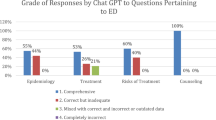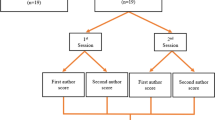Abstract
High blood pressure is one of the major public health problems that is prevalent worldwide. Due to the rapid increase in the number of users of artificial intelligence tools such as ChatGPT and Bing, it is expected that patients will use these tools as a source of information to obtain information about high blood pressure. The purpose of this study is to check the accuracy, completeness, and reproducibility of answers provided by ChatGPT and Bing to the knowledge questionnaire of blood pressure control at home. In this study, ChatGPT and Bing’s responses to the HBPM 10-question knowledge checklist on blood pressure measurement were independently reviewed by three cardiologists. The mean accuracy rating of ChatGPT was 5.96 (SD = 0.17) indicating the responses were highly accurate overall, with the vast majority receiving the top score. The mean accuracy and completeness of ChatGPT were 5.96 (SD = 0.17) and 2.93 (SD = 0.25) and in Bing were 5.31 (SD = 0.67), and 2.13 (SD = 0.53) Respectively. Due to the expansion of artificial intelligence applications, patients can use new tools such as ChatGPT and Bing to search for information and at the same time can trust the information obtained. we found that the answers obtained from ChatGPT are reliable and valuable for patients, while Bing is also considered a powerful tool, it has more limitations than ChatGPT, and the answers should be interpreted with caution.

This is a preview of subscription content, access via your institution
Access options
Subscribe to this journal
Receive 12 print issues and online access
$259.00 per year
only $21.58 per issue
Buy this article
- Purchase on Springer Link
- Instant access to full article PDF
Prices may be subject to local taxes which are calculated during checkout




Similar content being viewed by others
References
WHO. Hypertension 2023. Available from: https://www.who.int/health-topics/hypertension#tab=tab_1.
Lawes CM, Vander Hoorn S, Rodgers A, International Society of H. Global burden of blood-pressure-related disease, 2001. Lancet. 2008;371:1513–8.
Pan J, Lei T, Hu B, Li Q. Post-discharge evaluation of medication adherence and knowledge of hypertension among hypertensive stroke patients in northwestern China. Patient Prefer Adherence. 2017;11:1915–22.
Akoko BM, Fon PN, Ngu RC, Ngu KB. Knowledge of hypertension and compliance with therapy among hypertensive patients in the Bamenda Health District of Cameroon: a cross-sectional study. Cardiol Ther. 2017;6:53–67.
Abegaz TM, Shehab A, Gebreyohannes EA, Bhagavathula AS, Elnour AA. Nonadherence to antihypertensive drugs: a systematic review and meta-analysis. Medicine. 2017;96:e5641.
Sharma S, Bhuvan K, Alrasheedy AA, Kaundinnyayana A, Khanal A. Impact of community pharmacy-based educational intervention on patients with hypertension in Western Nepal. Australas Med J. 2014;7:304–13.
Almas A, Godil SS, Lalani S, Samani ZA, Khan AH. Good knowledge about hypertension is linked to better control of hypertension; a multicentre cross sectional study in Karachi, Pakistan. BMC Res Notes. 2012;5:1–8.
Whelton PK, Carey RM, Aronow WS. ACC/AHA/AAPA/ABC/ACPM/AGS/APhA/ASH/ASPC/NMA/PCNA guideline for the prevention, Detection, evaluation, and management of high blood pressure in adults: a Report of the American College of Cardiology/American Heart Association Task Force on Clinical Practice Guidelines. J Am Coll Cardiol. 2018;7:68–74.
McCormack T, Krause T, O’Flynn N. Management of hypertension in adults in primary care: NICE guideline. Br J Gen Pr. 2012;62:163–4.
Glynn LG, Murphy AW, Smith SM, Schroeder K, Fahey T. Self-monitoring and other non-pharmacological interventions to improve the management of hypertension in primary care: a systematic review. Br J Gen Pr. 2010;60:e476–88.
Tucker KL, Sheppard JP, Stevens R, Bosworth HB, Bove A, Bray EP, et al. Self-monitoring of blood pressure in hypertension: a systematic review and individual patient data meta-analysis. PLoS Med. 2017;14:e1002389.
Fu SN, Dao MC, Wong CKH, Cheung BMY. The association of health literacy with high-quality home blood pressure monitoring for hypertensive patients in outpatient settings. Int J Hypertens. 2020;2020:7502468–15.
Van Dis EA, Bollen J, Zuidema W, van Rooij R, Bockting CL. ChatGPT: five priorities for research. Nature. 2023;614:224–6.
Bohr A, Memarzadeh K. The rise of artificial intelligence in healthcare applications. In: Bohr A, Memarzadeh K, editors. Artificial Intelligence in Healthcare. 2020;25–60. https://doi.org/10.1016/b978-0-12-818438-7.00002-2.
Wen Z, Huang H. The potential for artificial intelligence in healthcare. J Commerc Biotechnol. 2022;27.
Tan P, Xi Y, Chao S, Jiang D, Liu Z, Fan Y, et al. An artificial intelligence-enhanced blood pressure monitor wristband based on piezoelectric nanogenerator. Biosens. 2022;12:234.
Hare AJ, Chokshi N, Adusumalli S. Novel digital technologies for blood pressure monitoring and hypertension management. Curr Cardiovasc Risk Rep. 2021;15:11.
Yeo YH, Samaan JS, Ng WH, Ting PS, Trivedi H, Vipani A, et al. Assessing the performance of ChatGPT in answering questions regarding cirrhosis and hepatocellular carcinoma. Clin Mol Hepatol. 2023;29:721–32.
Graham F. Daily briefing: Will ChatGPT kill the essay assignment?. Nature. 2022.https://doi.org/10.1038/d41586-022-04437-2.
O’Connor S. Open artificial intelligence platforms in nursing education: Tools for academic progress or abuse? Nurse Educ Pr. 2023;66:103537.
Lopezosa C. Bing chat: hacia una nueva forma de entender las búsquedas. Anuario ThinkEPI. 2023;17.
Alberts IL, Mercolli L, Pyka T, Prenosil G, Shi K, Rominger A, et al. Large language models (LLM) and ChatGPT: what will the impact on nuclear medicine be? Eur J Nucl Med Mol imaging. 2023;50:1549–52.
Bing Chat Details. 2023. https://www.bing.com/new.
Fu SN, Dao MC, Wong CK, Cheung BM. Knowledge and practice of home blood pressure monitoring 6 months after the risk and assessment management programme: does health literacy matter? Postgrad Med J. 2022;98:610–6.
Samaan JS, Yeo YH, Rajeev N, Hawley L, Abel S, Ng WH, et al. Assessing the accuracy of responses by the language model ChatGPT to questions regarding bariatric surgery. Obes Surg. 2023;33:1–7.
Rahsepar AA, Tavakoli N, Kim GHJ, Hassani C, Abtin F, Bedayat A. How AI responds to common lung cancer questions: ChatGPT vs Google Bard. Radiology. 2023;307:e230922.
Butte AJ. Artificial intelligence-from starting pilots to scalable privilege. JAMA Oncol. 2023;9:1341–2.
Cai LZ, Shaheen A, Jin A, Fukui R, Yi JS, Yannuzzi N, et al. Performance of generative large language models on ophthalmology board-style questions. Am J Ophthalmol. 2023;254:141–9.
Kumari A, Kumari A, Singh A, Singh SK, Juhi A, Dhanvijay AKD, et al. Large language models in hematology case solving: a comparative study of ChatGPT-3.5, Google Bard, and Microsoft Bing. Cureus. 2023;15:e43861.
Pham BD, Kim BG, Nguyen TTH, Hoang VM. Exposure to messages on risk factors for noncommunicable diseases in a rural province of Vietnam. Biomed Res Int. 30;2019:7962947.
Lee YJ, Boden-Albala B, Jia H, Wilcox A, Bakken S. The association between online health information–seeking behaviors and health behaviors among Hispanics in New York City: a community-based cross-sectional study. J Med Internet Res. 2015;17:e261.
Ng JY, Jomy J, Vacca A. Evaluation of the quality of online patient information at the intersection of complementary and alternative medicine and hypertension. Clin Hypertens. 2022;28:9.
Tahir M, Usman M, Muhammad F, Rehman SU, Khan I, Idrees M, et al. Evaluation of quality and readability of online health information on high blood pressure using DISCERN and Flesch-Kincaid tools. Appl Sci. 2020;10:3214.
Oloidi A, Nduaguba SO, Obamiro K. Assessment of quality and readability of internet-based health information related to commonly prescribed angiotensin receptor blockers. Pan Afr Med J. 2020;35:70.
Van Bulck L, Moons P. What if your patient switches from Dr. Google to Dr. ChatGPT? A vignette-based survey of the trustworthiness, value, and danger of ChatGPT-generated responses to health questions. Eur J Cardiovasc Nurs. 2023.
Acknowledgements
In this section, Fasa University of Medical Sciences was thanked for its financial support.
Funding
This study was supported by the Fasa University of Medical Sciences.
Author information
Authors and Affiliations
Contributions
MM, ZK wrote the first draft of the manuscript. Authors MM, ZK, MK, MZ performed data collection. MK performed an analysis and extracted the main characteristics. All authors MM, ZK, MK, MZ reviewed and provided critical feedback. All authors read and approved the final manuscript.
Corresponding author
Ethics declarations
Conflict of interest
The authors declare no competing interests. The authors declare that they have no known competing financial interests or personal relationships that could have appeared to influence the work reported in this paper.
Ethics statement
This study was extracted from a research supported financially by the Fasa University of Medical Sciences with the ethics code of IR.FUMS.REC.1402.025. URL: https://ethics.research.ac.ir/ProposalCertificateEn.php?id=340398&Print=true&NoPrintHeader=true&NoPrintFooter=true&NoPrintPageBorder=true&LetterPrint=true
Additional information
Publisher’s note Springer Nature remains neutral with regard to jurisdictional claims in published maps and institutional affiliations.
Supplementary Information
Rights and permissions
Springer Nature or its licensor (e.g. a society or other partner) holds exclusive rights to this article under a publishing agreement with the author(s) or other rightsholder(s); author self-archiving of the accepted manuscript version of this article is solely governed by the terms of such publishing agreement and applicable law.
About this article
Cite this article
Niko, M.M., Karbasi, Z., Kazemi, M. et al. Comparing ChatGPT and Bing, in response to the Home Blood Pressure Monitoring (HBPM) knowledge checklist. Hypertens Res 47, 1401–1409 (2024). https://doi.org/10.1038/s41440-024-01624-8
Received:
Revised:
Accepted:
Published:
Issue Date:
DOI: https://doi.org/10.1038/s41440-024-01624-8



